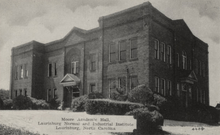Laurinburg Institute
| Laurinburg Institute | |
|---|---|
| Address | |
|
125 McGirts Bridge Rd. Laurinburg, North Carolina 28352 | |
| Coordinates | 34°46′59″N 79°27′24″W / 34.783179°N 79.456594°WCoordinates: 34°46′59″N 79°27′24″W / 34.783179°N 79.456594°W |
| Information | |
| Motto | Deeds, not words |
| Religious affiliation(s) | Nonsectarian |
| Established | 1904 |
| CEEB code | 342176 |
| Head of school | Mr. F.H. McDuffie, Jr. |
| Teaching staff | 9[1] |
| Grades | 9-12 |
| Enrollment | 80 |
| Team name | Tigers |
| Website |
www |

Laurinburg Institute is a historic African American preparatory school in Laurinburg, North Carolina. The school was founded in 1904 by Emmanuel Monty and Tinny McDuffie at the request of Booker T. Washington.
The school is particularly noted for its output of highly accomplished alumni as well as a rich basketball tradition, having produced several All-Americans. Its most notable basketball alumni include Sam Jones, NBA Hall of Famer with the Boston Celtics, and Charlie Scott, an All-American at UNC and NBA All-Star.[2]
Despite its storied history, Laurinburg may be caught up in a relatively new effort to rein in so-called “basketball academies,” which are typically new private schools tied to a church or municipal basketball league that try to lure students with big hopes of becoming a star and earning a lucrative NBA contract.
The schools have picked up since 2006 when the NBA implemented new draft eligibility rules that require players to be at least 19 years old and one year removed from high school graduation. Since college experience is not needed, students may attend these institutions, throughout and after high school, to focus more on their basketball skills than academics.
That same year the NCAA began routinely reviewing prep schools for academic irregularities, including reviewing the transcripts of prep school student-athletes seeking to play at NCAA-member institutions. (By virtue of meeting state requirements, public schools do not receive the same scrutiny.) The irregularities found in students’ transcripts at schools sanctioned as “not cleared” include dramatic academic improvement over a short period of time and the taking of sequential courses at the same time. In Laurinburg’s case, the NCAA, after two on-site visits, raised concerns about the curriculum and quality control, among other issues.
McDuffie says he’s tried and failed to learn from the NCAA what precisely is wrong with his school and how he can fix it. “I gave up communicating with them last fall,” he says.
NCAA spokeswoman Jennifer Royer says the NCAA does not disclose to the public the findings of its investigations, and she declined to comment specifically on the Laurinburg Institute, other than to confirm that the institute’s appeal was denied.
Royer says to be cleared Laurinburg must “offer courses that meet minimum NCAA eligibility requirements,” and the association has staff who work with schools to help them meet NCAA requirements. This is the first time Laurinburg has not been cleared, and it is among more than 60 institutions whose courses are discredited by the NCAA.
Such NCAA policies have long been controversial. Joe Nathan, director of the Center for School Change at Macalester College in St. Paul, Minn., says the NCAA has issued sweeping rulings without much transparency or explanation.
“They’re like the great school board in the sky,” says Nathan, who led a movement in the late 1990s to get the NCAA to change its policies claiming that courses offered by private or parochial schools were not college prep-level and not worthy of NCAA sanction. “We’ve documented situations where National Merit scholars were not allowed to play in college because of alleged academic deficiencies.”
The most recent round of NCAA probes has prompted at least one lawsuit. Star forward Michael Glover, for instance, was “not cleared” by the NCAA when in 2007 he left a private prep school found lacking by the NCAA to play at Seton Hall University. He sued, claiming that the NCAA never specified why it deemed his senior year transcript at American Christian Academy in Aston, Pa., unacceptable. His suit was dismissed, and Glover now plays at the College of Eastern Utah.
American Christian Academy was one target of the NCAA in its probe of “basketball academies.” Another institution “not cleared” by the NCAA, Lutheran Christian Academy in Philadelphia, did not have its own school building or formal classrooms but operated from a community center, The Washington Post reported.
Some “basketball academies” are dangerous frauds, says Robert Hughes, an 81-year-old retired coach who compiled a record 1,333 wins in 47 years at I.M. Terrell and Dunbar high schools in Fort Worth, Texas. Hughes says some schools do little to educate players while drawing talent away from more traditional sports programs.
If the children leave the private academies later for mainstream schools, “we have to re-educate them, even on how to play basketball,” says Hughes. “They are taught the ‘me-and-I’ style of play that isn’t team play but let’s them think they are already stars,” he says.
Notable alumni
- Renaldo Balkman
- Spider Bennett
- Mike Evans
- Dizzy Gillespie [3]
- Sam Jones
- Earl "The Goat" Manigault
- Magnum Rolle
- Charlie Scott
- Jimmy Walker
- Chris Washburn
- Shawne Williams
- Joey Dorsey
- Chris Johnson
- Arvydas Eitutavičius
- Dexter Westbrook
- Joe Budden
References
- ↑ "School Detail for Laurinburg Institute". National Center for Educational Statistics.
- ↑ "Tiny prep school well represented at NCAAs". Associated Press. 2006-04-01.
- ↑ Brown, Claude (1980-02-03). "In Love With the Trumpet; Dizzy Author's Query". New York Times. p. BR4.
At 16, the future father of bebop entered Laurinburg Institute... In 1935 he left Laurinburg Institute and joined his family at their new home...